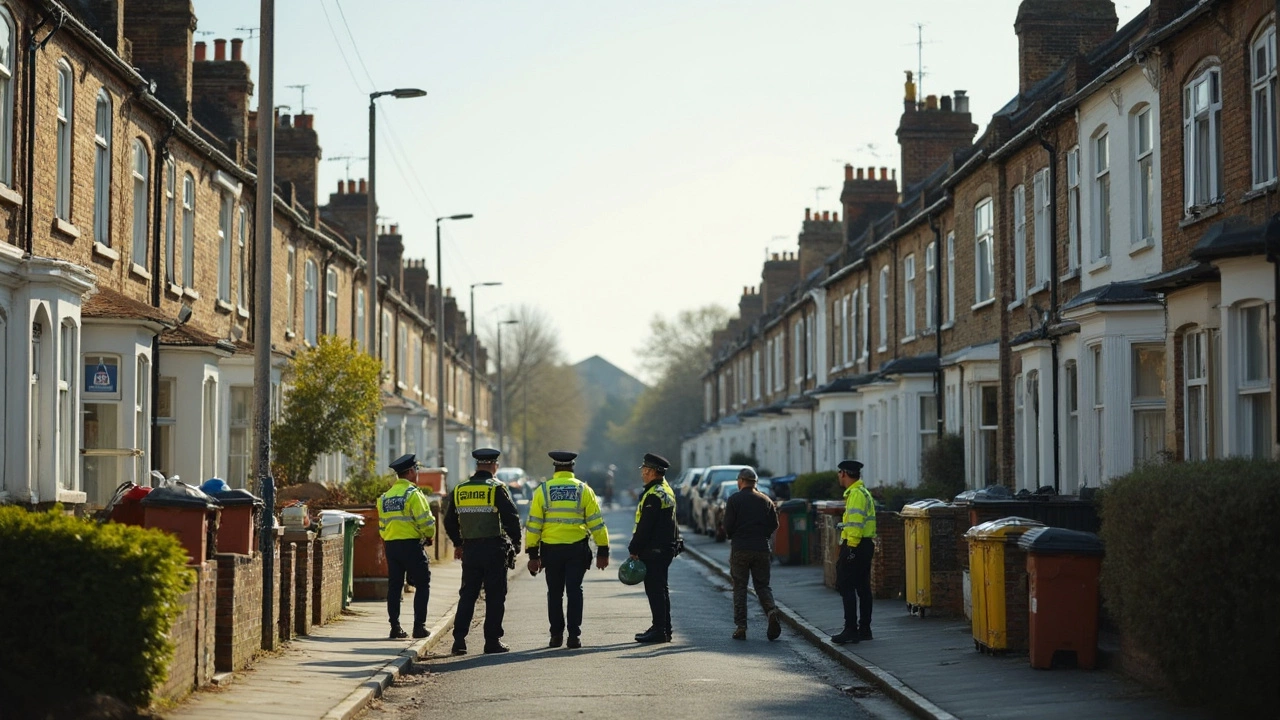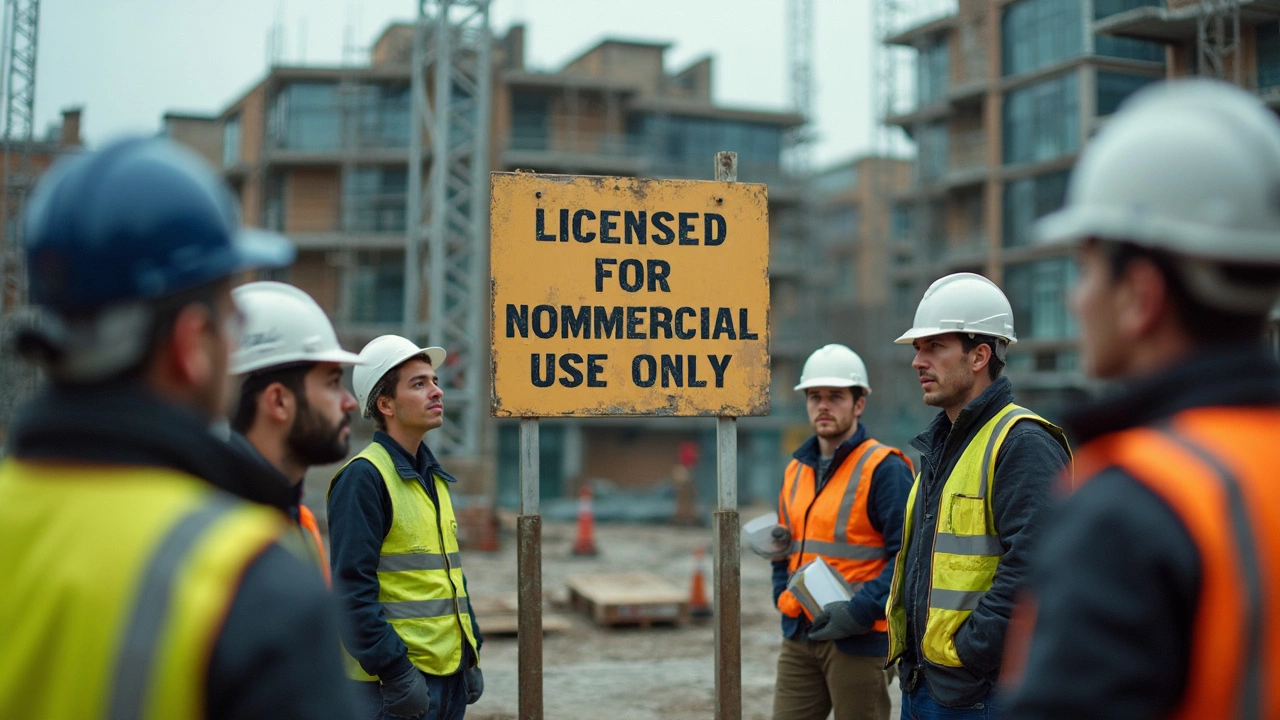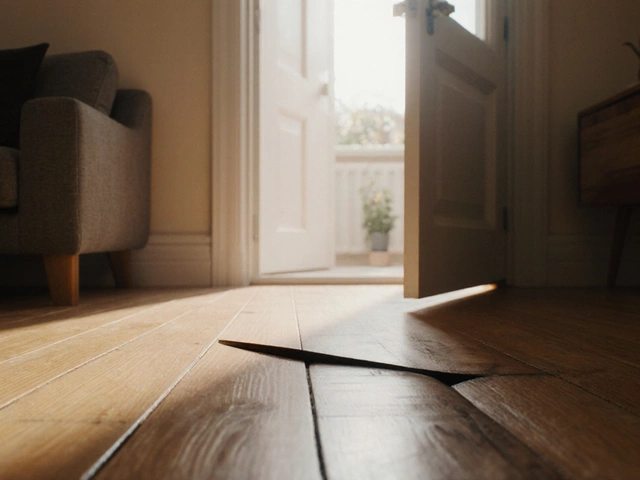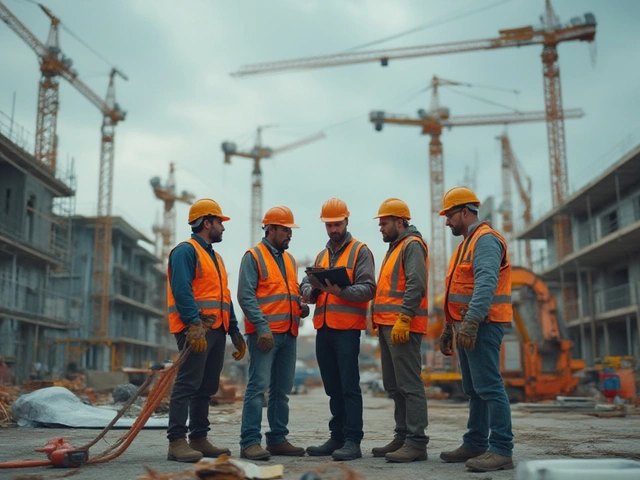Ever been told a contractor is “licensed for non-commercial” but not really sure what that means for your building plans? This isn’t just paperwork—it can decide whether your next project gets shut down or hits the ground running. The difference between non-commercial and commercial licensing isn't just a line on a business card; it can turn into big headaches if ignored.
In construction, a “licensed for non-commercial” tag usually means someone is cleared to work on homes or small residential spaces only, not those big office builds or retail spots. It’s not a minor technicality. Local governments take it seriously because safety codes, materials, and even business insurance get way more intense for anything commercial.
If you let a non-commercial contractor work on your shop, office, or restaurant remodel, permits can get denied. You could also lose coverage if there’s an accident. That’s something insurance agents don’t exactly ignore. Bottom line: always ask for proof of the right license before signing anything. It’s easy to forget in the rush, but skipping this step can cost you plenty.
- What Does 'Licensed for Non-Commercial' Really Mean?
- Where Do You See This License in Construction?
- The Risks of Using a Non-Commercial License in Commercial Work
- Typical Examples on Jobsites
- Tips to Stay Out of Trouble
- Frequently Asked Questions
What Does 'Licensed for Non-Commercial' Really Mean?
So, what’s actually behind the term “licensed for non-commercial” in construction? It’s pretty simple: this license only covers work on residential buildings, like single-family homes, duplexes, condos, or small apartment buildings. If we’re talking about big spaces for business, like malls, gyms, hotels, or offices, this license just doesn’t cut it—it’s a hard line.
This isn’t a random rule. Cities, counties, and lots of states split licenses because building codes and safety laws are totally different for homes versus businesses. When you build or remodel a house, the risks and expected traffic are way lower than, say, running a new restaurant or setting up shop in a strip mall. In most regions (like Texas, California, and Florida), the requirements for commercial licenses are tougher: contractors need to prove more experience, pass different tests, and have more complex insurance. If someone only meets the minimum for houses, they don’t get the green light for commercial stuff.
Here’s a quick cheat sheet on how the licenses stack up:
| Project Type | Requires Commercial License? | Covered by Non-Commercial? |
|---|---|---|
| Private home remodel | No | Yes |
| Apartment complex (4+ units) | Yes | No |
| Office buildout | Yes | No |
| New single-family house | No | Yes |
| Retail renovation | Yes | No |
If you spot “licensed for non-commercial” on a business card or website, it just means that person isn’t legally cleared to do jobs for businesses—only private homes. There are even fines for using the wrong license on the wrong type of job, and those add up fast. In 2023, California reported that fines for unlicensed commercial work ranged from $1,000 to $15,000—just for a first-time offense.
Need to remember the difference? Here’s a tip: if people are going to live there, you’re safe with a non-commercial license. If people will work or shop there, you probably need commercial. When in doubt, call your local licensing office—they usually pick up and will save you a lot of trouble.
Where Do You See This License in Construction?
If you’ve ever poked around at city hall or scrolled through online permit portals, you’ve probably seen the term “licensed for non-commercial” all over building permit forms and contractor profiles. This license comes up most when working on smaller projects like single-family homes, townhouses, or duplexes. Basically, if a space is meant for folks to live in—not run a business out of—it’s considered non-commercial.
The real world is full of places where this distinction pops up. Think home renovations, garage builds, decks, or even stuff like swimming pools or backyard sheds. Here are some spots where the non-commercial license is usually required:
- Residential renovations—kitchens, bathrooms, basements
- Single or multi-family dwellings (like houses and duplexes)
- New home construction projects
- Accessory buildings, such as detached garages or workshops on private property
- Fence or small landscaping jobs for homes
But let’s be honest—the line gets blurry sometimes. In mixed-use developments (those snazzy buildings with shops on the ground floor and apartments upstairs), contractors need the exact license that matches the area being worked on. One license won’t cover both residential and retail sections.
Every city and state does things a little differently, but the main principle is simple. If the end goal is a place for people to live, not work, you’ll see the non-commercial license come up. Check out some key differences between license types in this quick chart:
| Type | What It's For | Common Projects |
|---|---|---|
| Non-Commercial License | Residential properties only | Home renovations, garages, sheds |
| Commercial License | Business or mixed-use spaces | Offices, restaurants, retail stores |
Here’s a tip: always read the fine print when hiring. The most important thing? Make sure your pro carries the correct licensed for non-commercial credentials for your residential work, or you could hit a brick wall with local inspectors.
The Risks of Using a Non-Commercial License in Commercial Work
This is where folks get themselves in serious trouble. Just because someone can fix up your cousin’s kitchen doesn’t mean they’re allowed to put up walls at your new café. Here’s what happens if you hire someone with a licensed for non-commercial background for a commercial job.
- Permits Get Denied or Pulled: Cities and counties run permit checks. If the license doesn’t match the work, your project can get red-flagged and shut down on the spot. No work means lost time and a bigger bill.
- Insurance Refuses to Pay: Commercial insurance policies are sticklers for detail. An accident on site—maybe a blocked fire exit or a slip—can mean your insurer walks away, leaving you with medical bills or worse.
- Fines and Penalties: Local governments love paperwork. If inspectors see commercial work being done by someone with the wrong license, expect fines. In some places, it can be a few hundred bucks a day, and in a few states, penalties have topped $10,000.
- Building Could Be Unsafe: Non-commercial contractors might not be familiar with more complex commercial building codes, which deal with things like fire suppression, deep foundations, or heavy-duty HVAC systems. Cutting corners here isn’t just illegal—it’s unsafe.
In 2024, a survey of construction supervisors in Texas showed that 28% of failed inspections at small commercial sites came from licensing and permit issues. That’s not a rounding error—it’s a sign a lot of people still don’t get the difference.
| Risk | Potential Cost or Impact |
|---|---|
| Permit Failure | Delays (2-4 weeks), re-application fees (avg: $500+) |
| Insurance Denial | Out-of-pocket expenses (thousands), liability exposure |
| Fines for Violations | $200–$10,000 (varies by city/state) |
| Redoing Substandard Work | Project delays, extra labor/materials (15–40% cost increase) |
If you’re ever unsure, check with your local licensing department. It’s a five-minute call that could save you months of fixing mistakes. Don’t take the risk—always match the license to the job.

Typical Examples on Jobsites
Let’s break it down with some real situations you might spot on a jobsite. Picture a contractor with a “licensed for non-commercial” sticker on his truck. He’s putting up drywall in a family's new home—totally by the book. But that same contractor can’t legally renovate an office lobby downtown, even if it feels like “just drywall” again. The rules change once the address isn’t residential.
Here’s another classic: plumbing work. In most states, a non-commercial license lets you fix a broken pipe in a neighbor’s condo, but not install sinks in a new restaurant. Health regulations for businesses are stricter. Inspectors actually check into who did the work, and if it’s not the right license, the business owner can get slapped with fines or delays.
Even small stuff can get dicey. A non-commercial contractor might build a great backyard deck. But if you ask them to frame a storefront window for your new shop, you’re both crossing a line with the permit office. Inspections get tighter for anything business-related, and records are public. So if there’s ever a problem, it’s easy for someone to spot who held the wrong license.
- Residential: Kitchen remodels, new home construction, fencing, and standard electrical work within private homes.
- Non-Residential (No-Go Zone): Mall kiosks, commercial storefronts, large-scale HVAC systems in an office, or electrical upgrades for factories—these always need a *commercial* construction license.
If you ever see a jobsite where residential vans are parked at a strip mall remodel, it’s a red flag. Permitting offices love to do spot checks. Contractors with only a non-commercial permit can’t talk their way out of fines or forced shutdowns if they’re caught.
Banks and insurance companies are also strict here. They check license classes before releasing funds or covering accidents. If they find out a licensed for non-commercial contractor worked on anything commercial, those checks (and coverage) freeze up in seconds. Bottom line: match the license to the job, every time. It isn’t just paperwork—it’s the difference between business as usual or a construction nightmare.
Tips to Stay Out of Trouble
If you want zero headaches with your construction project, you’ve got to play it smart. Letting a crew work without the right license is asking for trouble—think fines, delays, or even being forced to redo work entirely. Here’s what you need to watch out for.
- Check licenses yourself: Don’t just take someone’s word for it. Most state contractor boards have fast online lookups. All you need is a name or license number. The California Contractors State License Board, for example, lets you check any license for free.
- Ask for documentation up-front: Before work kicks off, get a copy of the license and confirm it covers licensed for non-commercial or commercial, as needed. Contractors who get annoyed by this step are usually hiding something.
- Care about the job type: If you’re flipping a house for personal use, a non-commercial license is fine. But even a small project in a strip mall, like a bakery buildout, requires a commercial license in most places.
- Don’t rely on insurance alone: Insurers often refuse claims if the wrong license was used. According to a 2023 study by the National Association of Insurance Commissioners, nearly 60% of denied construction claims traced back to improper licensing.
- Watch for red flags: Super low bids, contractors who say permits "aren’t really needed," or those who want all cash, could be skirting licensing requirements.
Here’s a quick cheat sheet showing what usually happens if you break the rules:
| Action | Possible Trouble |
|---|---|
| Hire a non-commercial contractor for an office build | Permit denied, work halted or torn down, fined |
| Skip license check on commercial jobs | Insurance claim denied, project delays |
| Use fake or expired license | Fraud charges, permanent ban from future permits |
The main thing? Double-check the license matches the project. Don’t get tricked into thinking a residential license will slide by for a commercial job—inspectors check. Take two minutes and look it up before a single hammer swings, and you’ll save yourself a mountain of hassle and cash.
Frequently Asked Questions
If the words licensed for non-commercial still leave you scratching your head, these answers should clear things up. Here are the top questions people throw at me all the time (and some that I wish they would ask before trouble hits):
- Can a non-commercial license holder work on my store or office?
No. Non-commercial licenses usually cover only residential projects, like single-family homes, duplexes, or sometimes basic home additions. Commercial spaces—think coffee shops, offices, warehouses, or mixed-use buildings—need a contractor with a commercial license, no wiggle room. - What happens if I use a non-commercial contractor for a commercial job?
Your city can stop your project in its tracks with a red tag or violation notice. You might have to pause the job while you hire the right contractor, or in the worst case, rip out work already done. Your insurance can also straight-up deny claims if something goes wrong. - How do I spot the correct license?
Ask your contractor to show their license and check the details. Most states have public online directories where you can search a company or person’s license number and see what type it is. If it doesn’t say “commercial,” don’t risk it. - Are there penalties for hiring the wrong type of contractor?
Yep. Besides having to redo work, you could be fined by the local building department. The contractor can also face a hefty fine, lose their license, or both. - Where can I check license requirements by state?
Every state handles this a little differently. Check your state’s department of labor site, or the state contractor licensing board. Many have FAQ pages or printable guides. Don’t take a contractor’s word for it, do your own homework—especially if money or safety’s on the line. - Can a non-commercial contractor get a commercial license?
Sure, but they’ll have to apply, usually provide proof of experience on bigger jobs, and pass a separate test that covers commercial building codes and regulations.
To break it down, here’s a simple comparison table:
| Project Type | Can Use Non-Commercial License? | Needs Commercial License? |
|---|---|---|
| Home Remodel | Yes | No |
| Retail Store Build-Out | No | Yes |
| Restaurant Kitchen Installation | No | Yes |
| Small Backyard Shed | Yes | No |
| Apartment Complex | No | Yes |
So before you hand over a deposit, ask about the license, double-check it, and don’t feel bad digging for details. Missteps can get expensive fast, and nobody’s got time or budget for that kind of mess.





